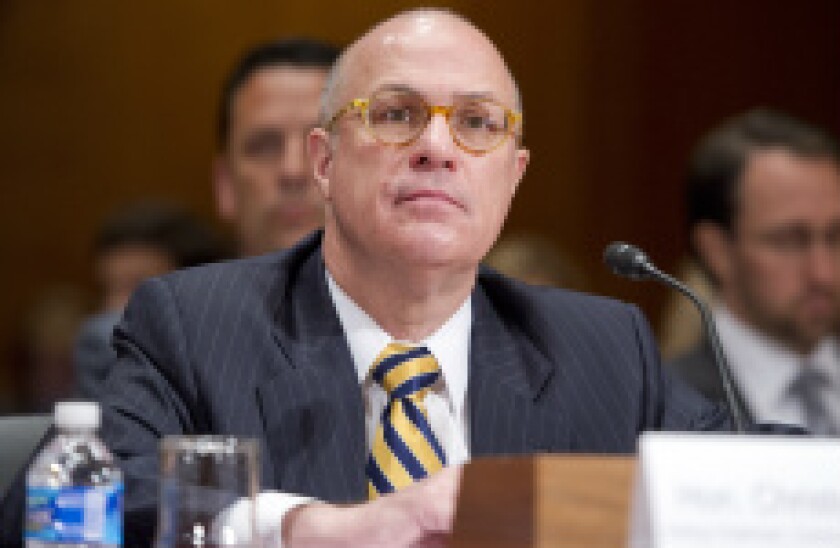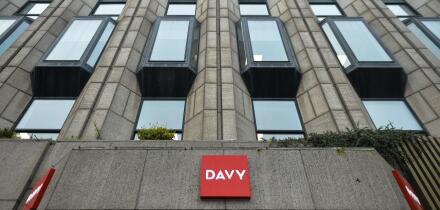GlobalCapital: How has your crisis been?
Christopher Giancarlo: Since leaving the Commission, I have set myself up in a pretty effective home office, just outside New York City. Operationally I have not found the Covid-19 crisis to be much of a problem. But at the same time, I am part of a community in a suburban town that has people from all walks of life. So, I am very aware of the struggles others are having.
I also keep my ear to the ground on what is going on in markets. And there are a lot of operational challenges there. On Wall Street, we experienced first 9/11 and then super storm Sandy [in 2012], both of which had devastating effects on trading and broking. The upside was that it caused firms to improve their business continuity systems. Much of their front office has become automated.
I am very impressed with the ability of exchange traded and over the counter markets to manage through this period; no one has seen anything like what we are seeing now. Unlike the last crisis, this crisis was self-generated and took place in an incredibly short period. For now, the stock market has recovered about 70% of its losses during the Covid-19 crisis while coping with remote working. It is quite remarkable.
It also seems to have confirmed something that I have long said, which is that while e-trading is directionally the natural progression of markets, there still is no substitute for a degree of voice negotiation in OTC markets in times of crisis and market confusion.
My understanding is that in the last few weeks European fixed income markets have gone back to voice trading because bilateral negotiation is needed in times when it is very difficult to get a full price curve. Sometimes there is just no substitute for human interaction. That may come as a surprise to those who thought e-trading should be a complete replacement for negotiated OTC market activity.
The past few months have seen extraordinary moves in markets, in particular negative oil prices. How much of a challenge does that create for regulators?
Negative price moves are not entirely unprecedented in derivatives markets. But it does create novel technical challenges. Also, people don’t have contemporary experience with such moves.
What regulators need to do in circumstances like that is make sure both exchanges and clearing houses are well prepared, checking in with them in advance to make sure they have policies and procedures in place and have been in touch with their market participants and members.
Throughout the period they should then make sure their margin models are contemplating negative rates, so they can anticipate them and know how they are going to handle them. And then during that period of negative rates, make sure the amounts of variation margin are being calculated properly and handle any defaults properly. From a regulator’s point of view, it is about good regulatory practice.
This has been the first major crisis since 2008. How do you feel reforms brought in since then have held up?
Broadly the regulations have done very well. The reforms and, indeed, the reformers deserve a lot of credit. A lot of the reforms were appropriately focused on the solvency risk of financial institutions. As a result of those increased capital requirements, we haven’t seen large defaults of financial institutions that we saw during the last crisis.
However, what we have seen in this crisis are challenging market trading conditions, where central banks have had to step in and to a certain degree be liquidity providers to certain government debt markets. It confirms a concern that I have had all along: that in solving for solvency risk we have engendered some degree of market illiquidity risk. Risk is like a big balloon that you squeeze on one side and it expands on another. I have always said that we need to properly calibrate our capital requirements, so as not to engender market illiquidity.
We can’t only ask the question of how much capital has to be reserved on bank balance sheets for enhanced bank solvency without asking the question how much capital needs to stay in markets for healthy trading liquidity. It is not good enough to say banks are less active as dealers but that is fine because the lost activity is replaced by proprietary traders, because the latter provide a different kind of liquidity.
If I have one criticism of the reform effort, it is that it was too dominated by central bankers and did not have enough market regulators in the room. That could have made sure that the reforms were balanced between solving for bank solvency risk and solving for market liquidity.
If you are truly going to take up a holistic approach, then you need to balance concerns about financial institution solvency against trading liquidity in markets. Just as war is said to be too important to be left to the generals, effective macro-prudential regulation is too important to be left to central bankers.
But overall, the reforms must be credited. One reason we have done so well during this crisis is those reforms.
One pillar of that reform effort was the increased systemic importance of clearing houses. Have they had a good crisis?
In the current crisis, the major derivatives clearing houses have seen astronomically high volatility, margins on equity index products impacted by extraordinary equity trading velocity and volume, wider price spreads on credit default swaps than before the failures of Lehman Brothers and AIG, and an unparalleled price collapse in oil caused by imbalances among supply, demand and storage. Yet, the clearing houses have done very well during the crisis and I think they deserve a great deal of credit for how well they have managed this extraordinary situation.
But what I am concerned about is that notwithstanding how well they have done, there are initiatives coming out of the Financial Stability Board (FSB) that are once again overly focused on banking concerns, without adequate appreciation for market regulatory matters. I believe the FSB, separated from political oversight as it is, is not the right body to be taking direct action on clearing house resolution, which, should it ever happen, will have to be operationally and financially addressed by national regulators, like the CFTC and the Federal Deposit Insurance Corporation (FDIC).
The FSB has an important and ongoing role to play in the global financial system, monitoring and making recommendations on matters of true systemic risk. However, the FSB should not and must not overstep that role. It should not presume authority best left to competent national authorities under direct political control and oversight.
How can that dynamic be changed?
The CFTC is the world’s leading derivatives regulator and oversees the world’s largest derivatives markets. So, the first step would be for the CFTC to become a voting member of the FSB. It is a flaw in the FSB’s ability to speak to sophisticated issues of derivatives regulation without having the world’s premier derivatives regulator as a full member.
There have been some blow-ups of firms and their derivatives positions during the crisis. Can more be done to make derivatives safer in the next reform effort?
The blow-up of firms is not necessarily indicative of a system failure. The goal of a mature regulatory system should not be to ensure that no firms blow up.
Banks and investment firms have to take risk to generate a return. If they get that wrong, they have to pay the consequences. If you believe in dynamic markets, you have to allow that some firms get it wrong and fail while some firms get it right and succeed. Otherwise you have another “too big to fail” problem.
The goal of regulation has to be to allow firms to fail, yet take steps to ensure that their failure does not cause overall harm to the system. That is where clearing houses come in.
The role of clearing houses, unlike banks and trading firms, is to remain risk-neutral while properly allocating risk among its risk-taking clearing members. Market regulators understand this distinction.
Some parts of the post-2008 reform agenda have been delayed during the coronavirus crisis, notably the final stages of initial margin. Has this crisis shown the importance of regulatory flexibility?
In early 2017, there was a global deadline for implementation of variation margin. The CFTC led the global effort to change it from a hard deadline to a six-month phase-in period. Through CFTC leadership, the change was then adopted by the Federal Reserve and by other regulators around the world. It worked out very well.
Market regulators sometimes have to be sensitive to market conditions. Sometimes deadlines are set well in advance, when people are drafting legislation. But when you get to the actual deadline you realise facts on the ground have changed and you have to adjust accordingly. As someone who never wavered in my support for the financial reforms, I nevertheless insisted that we recognised facts on the ground. You may have to adjust as you go along with the overall goal in mind. Markets are durable but they do react badly to shocks, especially if those shocks are regulator-imposed.
What are the prospects for cross-border regulation in the post-Covid-19 world?
Whenever you do an analysis, you have to start by looking at the assumptions. In regulation, there were one or two initial assumptions that were prevalent in the wake of the 2008 financial crisis. One was that financial markets were the same all over the world and that therefore regulatory reform should be put in place in an almost identical form.
The problem is that Asian financial markets, especially derivatives, are very different from European ones and European ones are very different from American ones. And so, the goal of implementation of reform should never have been about “identicality”, it always should have been about “interoperability”.
The US needs to have a derivatives regulatory regime that reflects the conditions in American derivatives markets. US markets are very deep, liquid, diverse and established. They have a level of specialisation and global utilisation that is just not present elsewhere, including in continental Europe.
So, reforms in the US need to be well tailored to the US, and likewise reform in Europe needs to be tailored for Europe. So, when reformers, whether through an equivalence regime or other regimes, are seeking “identicalness”, that is an error. Instead, we need to respect and give deference to regulation that is well tailored to each national regime and then seek overall interoperability.
What do you make of the short selling bans that some countries introduced during the crisis?
I don’t support short sale bans. Their intention is to protect national champion enterprises but they distort price signals in the market. They might provide some short-term relief in a crisis, but are not conducive to long-term market development or attracting global capital and investment.
During your time at the CFTC you gave a lot of attention to cryptocurrencies. How has that interest developed since leaving?
While I am pleased to have become senior counsel to prominent law firm Willkie Farr & Gallagher, a large part of my work since leaving the CFTC has focused on leading a think tank for the development of a US central bank digital currency. It is called the Digital Dollar Project.
I am a believer that we are going from the first stage of the internet, which was an Internet of information, to a second phase, which is an internet of things of value, digitisation of value, whatever you want to call it. We saw the first ripples of it when I was at the CFTC with the movement of more and more global commodities into blockchain technology distribution systems. Then we saw the rise of cryptocurrency, and bitcoin futures.
Then we really started grappling with the coming wave, which will be when all things of value, especially things regulated by the CFTC, like agricultural commodities, as well as benchmarks and financial contracts, are going to be digitised, tokenised and programmable.
To the extent that the dollar is the world’s unit of account for most of the things of value, it seems to me that the dollar itself should become digital, tokenised and programmable.
I believe that just as the US has re-entered outer space through the SpaceX mission, it is time for the dollar to explore cyber space by playing a role in the development of central bank digital currency.
How have cryptocurrencies performed during the crisis?
The crisis has not been destructive to cryptocurrencies. It is still a nascent area of innovation, where there is a lot more to be developed. But the crisis didn’t diminish their core value proposition. In some cases, perhaps, the crisis revealed shortcomings in the traditional account based financial system that can potentially be addressed through digital asset development, including a digital, tokenised dollar.







